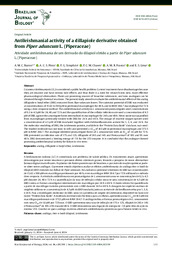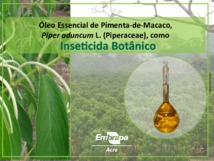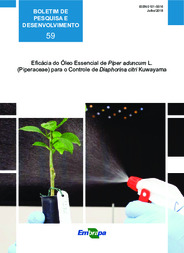Native plant is rich in dillapiole, raw material used in agricultural and pharmaceutical industries. During tests, it has reduced by 87% the attack of fruit borers and by 70% the presence of bugs. The botanical insecticide has also shown efficiency in the control of maize fall armyworm and Asian citrus psyllid, a citrus greening vector. The plant essential oil can be combined with conventional insecticides to reduce costs and environmental impacts. The plant is present in several Brazilian regions and especially grows in Acre state. Dillapiole degrades easily without posing health or environment risks. Researchers look for partnership with the production sector to develop a commercial product. Research carried out by Embrapa Acre verified that the essential oil of spiked pepper (Piper aduncum L.), a common plant in Amazonian states, has an insecticidal activity and can control different agricultural pests. In pineapple cultivars it has reduced by 87% the attacks of fruit borers and by 70% the presence of bugs, results that prove the efficiency of the product as a natural insecticide. Extracted from leaves and dry stalks through a steam distillation process, the spiked pepper essential oil is rich in dillapiole, a substance applied in several industrial sectors, especially the agro-chemical and pharmaceutical segments. Studies with the plant aim to enable the commercial use of dillapiole as a botanical insecticide and as complement of conventional insecticides to increase the efficiency of such products in the control of pests, reduce the use of chemicals in agricultural production, and mitigate impacts on human health and the environment. "Dillapiole can compose industrial synergistic insecticide formulas of distinct chemical groups, including pyrethroid products, synthetic chemical compounds that are similar to natural substances. It is possible to add a quarter of a liter of spiked pepper essential oil per liter of conventional insecticide and reduce by 25% the commercial dose recommended," explains the researcher Murilo Fazolin, responsible for the studies. The botanical insecticide has also shown efficiency in the control of fall armyworm (Spodoptera frugiperda) and Asian citrus psyllid (Diaphorina citri), an insect that transmits the bacteria Candidatus Liberibacter spp., the causal agent of citrus greening (Huanglongbing – HLB), the main citrus disease. Tests carried out with the product at an 85% concentration of dillapiole in laboratory and greenhouse revealed a 98% mortality rate of fall armyworm. The lethality of the Asian psyllid in the nymph stage was around 90% and 100% and the adult insect reached 99%. The research showed that the efficiency depends on the concentration used. "We have tested distinct dosages in a controlled environment and in field experiments and the results helped us to understand the functioning of the product and the insects and plants behavior in different temperature, humidity, and light conditions. We have verified that thin leaf plants presented sensitivity to dillapiole and due to such particularities we are looking for partnerships in the private sector to define proper formulas for each crop," Fazolin emphasizes. Harmless to the environment The Piper genre has more than 1,400 species and 400 of them are present in Brazil according to the International Plant Names Index (IPNI), a database by the Royal Botanic Gardens (Kew Gardens, UK), a world reference in botanics. Piper aduncum L. (spiked pepper) is found in several regions of Brazil and in the Amazon, it especially develops in the state of Acre. The scientific interest for the plant emerged two decades ago from a prospective study on Amazonian species with insecticide potential performed by Embrapa and other research institutions. In order to make the studies with Piper aduncum L., Embrapa Acre fperformed the species characterization, genetic selection, and conservation, a work that resulted in the creation of an Active Germplasm Bank (BAG) with 900 materials, from which plants multiplied in field are extracted for the production of the essential oil. The Corporation also invested in the installation of a plant for the experimental extraction of the product and the systematization of analytical protocols to measure dillapiole contents. Depending on the chemotype considered, spiked pepper essential oil contains between 18 and 56 different compounds, and the predominant one is dillapiole. Aiming to guarantee product chemical standardization and quality of the product researchers developed a purification process using a rectifier. After steam extraction the equipment performs the oil fractioning and increases dillapiole concentration to levels above 80%. According to Fazolin, the determination and control of the oil's purity degree are fundamental to assure the product efficiency and obtain effective results in the research. Because it is a natural substance, which degrades easily in the environment, dillapiole can be used in adequate concentrations in the control of pests without offering risks to human health and without causing damage to soil and water streams. Another competitive advantage of the product is the conservation of natural enemies. "Such aspects are essential to facilitate the offer of low environmental impact insecticides capable of contributing to sustainability of food production chains," he points out. Results Field tests carried out with pineapple crops revealed that the spiked pepper essential oil controls pineapple borers (Strymon megarus - Godart) (pictures on the side) and the pineapple bug Thlastocoris laetus Mayr. Farmer Cícero Medeiros Brandão resident of Ramal Belo Jardim in the Catuaba rubber plantation, located 20 kilometers from Rio Branco (Acre), one of the partners in the research proved the efficiency of the product on a commercial crop in large scale using a solution of 300 liters of waters, adhesive spreader, and 1.5 liters of spiked pepper oil of 80% dillapiole concentration, per hectare "I have always grown pineapple but losses in production used to reach 35% due to pest attacks even performing the chemical control. When I received the invite to test out the natural insecticide, I accepted the challenge and the results were surprising. We managed to reduce in 87% the occurrence of fruit borer and in 70% the presence of pineapple bugs in crops with sprays every two weeks. I see this technology as an opportunity to improve production and remain working with this crop," the farmer says. How the product works Insects are exposed to xenobiotic compounds (toxic substances) of several sources, including the same food they consume. However, they have the ability to produce enzymes that help to eliminate such toxic compounds off their organism through urine and feces. Dillapiole interferes in their metabolism and inhibits the functioning of such detoxifying enzymes blocking the auto-defense system. As a consequence, the toxins accumulate and cause the death of the insect by intoxication. "From this functioning mechanism, we have observed that added to conventional insecticides the essential oil of spiked pepper enhances the activity of such products. Even in lower doses, commercial defensives show an excellent performance due to the synergistic effect of dillapiole. It confirms that the oil rich in dillapiole, when combined with chemical insecticides, can result in a series of specific commercial formulas, becoming a high efficiency tool in the management of pest resistance," Fazolin says. Use in organic agriculture The list of products for use in organic agriculture approved by the Brazilian Ministry of Agriculture, Livestock, and Food Supply (Mapa), covers essential oils from different sources. Due to its low impact, the spiked pepper essential oil developed by Embrapa can be used as a natural insecticide both in traditional agriculture and in organic production, an activity which is in continuous expansion in some regions of the country. For the farmer Jesuína Braga, president of the Associação de Certificação Participativa (ACS), the only association accredited to certify organic production in Acre, the main challenge of organic agriculture is the control of pests and diseases. Organic food consumption is a trend because it is related to health and environmental conservation, but it is necessary to have technologies that enable the farmer to produce with the guarantee that they will reap what they sow. "Currently, we count on only 52 families in the organic production in Acre, still an initial number. The botanical insecticide emerges as a hope for the development of the activity within the state. Natural defensives are products with aggregated value and can contribute to ensure the offer of healthy and safe food for the consumer with the advantage that it does not harm the environment. The research has a prime role in this process of knowledge advance in the improvement of organic production," the farmer considers. According to the agricultural tax auditor Gustavo Ferreira da Silva, chief of the Agricultural Defense Division at the Federal Superintendence of Agriculture, Livestock and Supply of Acre, in Brazil the demand for food coming from low impact production systems has shown an increase between 10% and 15% per year. In 2019 the number of properties with this characteristic certificated by Mapa surpassed 22,000. "We work in the support of such production arrangements, the appreciation of local knowledge, and the strengthening of the trade spaces of organic and agroecological family production, in addition to fostering government initiatives focused in generating income. On the other hand, the research aims to guarantee technological innovations that align production and sustainability, especially in organic systems," the auditor recalls. He also adds that the offer of a natural product developed from a plant of the Amazonian biodiversity with wide presence in the territory of Acre proves this scientific concern. Essential oils and the bioeconomy Embrapa studies revealed that there is a promising market for essential oils due to its wide industrial application (from the livestock segment, food industry, cosmetics and perfumery, to medicine production, among other uses). Most products are extracted from biodiversity and fit into the context of the bioeconomy, an strategic area that has emerged for the socioeconomic development of the Amazon biome. "Spiked pepper can be part of a scenery of sustainable use of the region's biodiversity resources such as bioinput for the preparation of new technological solutions to improve production systems. In the context of innovation recommended by the National Bioinput Program, recently launched by Mapa, the species can contribute to generate jobs and income in local communities, reduction of the dependency of farmers to imported inputs, and expansion of the offer of raw materials for the agricultural sector," Fazolin assesses. Partnerships to have the technology reach the market The insecticides with natural active ingredients are products that are widely demanded once they can be used in the integrated management of pests in commercial crops in conventional agriculture and in organic production. Spiked pepper essential oil is an alternative for the development of new low cost agricultural defensives. The essential oil with a dillapiole concentration of 80% is now in the process of establishing a reference specification in order to get a concession registration of regularity of use by Mapa, the Brazilian Health Regulatory Agency (Anvisa), and the Brazilian Institute of the Environment and Renewable Natural Resources (Ibama). The confirmation of the registration request enables the technology to go to the stage of business partnership formalization, focusing in the product use for the development of bioactive insecticides (those with biological activity in the behavior of pests) and as synergistic of biodegradable insecticides based on dillapiole. Fazolin emphasizes that the partnership with agro-chemical companiesand other industrial segments is essential for the final stage of standardization and validation of technological innovation through commercial formulas that suit different crops, including thin leaf plants. Depending on the formula developed with the spiked pepper essential oil, the registration of a new technology should be created by the responsible company with the regulatory agencies of agricultural products. "We are prepared for an initial production of the essential oil to supply partners that are interested in investing in the industrial use of dillapiole and we have quality generic materials that can be passed on to farmers to prepare the first commercial cultivars of Piper aduncum L. Moreover, we can share unprecedented technical knowledge on the purification process of spiked pepper essential oil at the same time that, from the increase of product demand, we will work together with the partners to clarify the topics that are still challenging in the production system of the species, in the final stage," Fazolin recalls. To know more about this asset for partnership click here.
Photo: Priscila Viudes
![Priscila Viudes - There is a promising market for essential oils due to their industrial expansion - from the segments of animal farming, food industry, and cosmetics and perfumery to pharmaceutics. Priscila Viudes - There is a promising market for essential oils due to their industrial expansion - from the segments of animal farming, food industry, and cosmetics and perfumery to pharmaceutics.]()
There is a promising market for essential oils due to their industrial expansion - from the segments of animal farming, food industry, and cosmetics and perfumery to pharmaceutics.
-
Native plant is rich in dillapiole, raw material used in agricultural and pharmaceutical industries. -
During tests, it has reduced by 87% the attack of fruit borers and by 70% the presence of bugs. -
The botanical insecticide has also shown efficiency in the control of maize fall armyworm and Asian citrus psyllid, a citrus greening vector. -
The plant essential oil can be combined with conventional insecticides to reduce costs and environmental impacts. -
The plant is present in several Brazilian regions and especially grows in Acre state. -
Dillapiole degrades easily without posing health or environment risks. -
Researchers look for partnership with the production sector to develop a commercial product. |
Research carried out by Embrapa Acre verified that the essential oil of spiked pepper (Piper aduncum L.), a common plant in Amazonian states, has an insecticidal activity and can control different agricultural pests. In pineapple cultivars it has reduced by 87% the attacks of fruit borers and by 70% the presence of bugs, results that prove the efficiency of the product as a natural insecticide.
Extracted from leaves and dry stalks through a steam distillation process, the spiked pepper essential oil is rich in dillapiole, a substance applied in several industrial sectors, especially the agro-chemical and pharmaceutical segments. Studies with the plant aim to enable the commercial use of dillapiole as a botanical insecticide and as complement of conventional insecticides to increase the efficiency of such products in the control of pests, reduce the use of chemicals in agricultural production, and mitigate impacts on human health and the environment.
"Dillapiole can compose industrial synergistic insecticide formulas of distinct chemical groups, including pyrethroid products, synthetic chemical compounds that are similar to natural substances. It is possible to add a quarter of a liter of spiked pepper essential oil per liter of conventional insecticide and reduce by 25% the commercial dose recommended," explains the researcher Murilo Fazolin, responsible for the studies.
The botanical insecticide has also shown efficiency in the control of fall armyworm (Spodoptera frugiperda) and Asian citrus psyllid (Diaphorina citri), an insect that transmits the bacteria Candidatus Liberibacter spp., the causal agent of citrus greening (Huanglongbing – HLB), the main citrus disease. Tests carried out with the product at an 85% concentration of dillapiole in laboratory and greenhouse revealed a 98% mortality rate of fall armyworm. The lethality of the Asian psyllid in the nymph stage was around 90% and 100% and the adult insect reached 99%. The research showed that the efficiency depends on the concentration used.
"We have tested distinct dosages in a controlled environment and in field experiments and the results helped us to understand the functioning of the product and the insects and plants behavior in different temperature, humidity, and light conditions. We have verified that thin leaf plants presented sensitivity to dillapiole and due to such particularities we are looking for partnerships in the private sector to define proper formulas for each crop," Fazolin emphasizes.
 Harmless to the environment
Harmless to the environment
The Piper genre has more than 1,400 species and 400 of them are present in Brazil according to the International Plant Names Index (IPNI), a database by the Royal Botanic Gardens (Kew Gardens, UK), a world reference in botanics. Piper aduncum L. (spiked pepper) is found in several regions of Brazil and in the Amazon, it especially develops in the state of Acre. The scientific interest for the plant emerged two decades ago from a prospective study on Amazonian species with insecticide potential performed by Embrapa and other research institutions.
In order to make the studies with Piper aduncum L., Embrapa Acre fperformed the species characterization, genetic selection, and conservation, a work that resulted in the creation of an Active Germplasm Bank (BAG) with 900 materials, from which plants multiplied in field are extracted for the production of the essential oil. The Corporation also invested in the installation of a plant for the experimental extraction of the product and the systematization of analytical protocols to measure dillapiole contents.
Depending on the chemotype considered, spiked pepper essential oil contains between 18 and 56 different compounds, and the predominant one is dillapiole. Aiming to guarantee product chemical standardization and quality of the product researchers developed a purification process using a rectifier. After steam extraction the equipment performs the oil fractioning and increases dillapiole concentration to levels above 80%.
According to Fazolin, the determination and control of the oil's purity degree are fundamental to assure the product efficiency and obtain effective results in the research. Because it is a natural substance, which degrades easily in the environment, dillapiole can be used in adequate concentrations in the control of pests without offering risks to human health and without causing damage to soil and water streams. Another competitive advantage of the product is the conservation of natural enemies. "Such aspects are essential to facilitate the offer of low environmental impact insecticides capable of contributing to sustainability of food production chains," he points out.
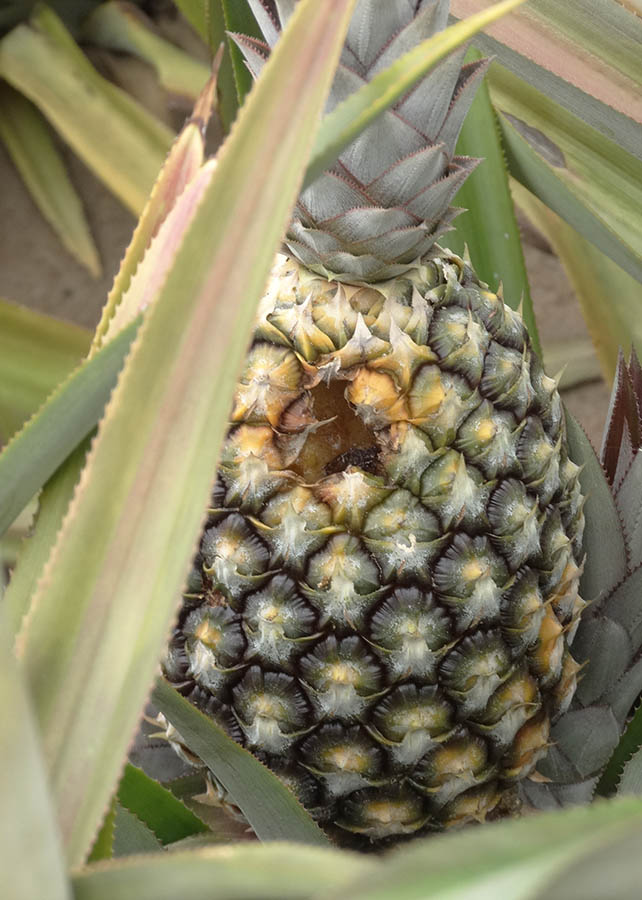 Results
Results
Field tests carried out with pineapple crops revealed that the spiked pepper essential oil controls pineapple borers (Strymon megarus - Godart) (pictures on the side) and the pineapple bug Thlastocoris laetus Mayr. Farmer Cícero Medeiros Brandão resident of Ramal Belo Jardim in the Catuaba rubber plantation, located 20 kilometers from Rio Branco (Acre), one of the partners in the research proved the efficiency of the product on a commercial crop in large scale using a solution of 300 liters of waters, adhesive spreader, and 1.5 liters of spiked pepper oil of 80% dillapiole concentration, per hectare
"I have always grown pineapple but losses in production used to reach 35% due to pest attacks even performing the chemical control. When I received the invite to test out the natural insecticide, I accepted the challenge and the results were surprising. We managed to reduce in 87% the occurrence of fruit borer and in 70% the presence of pineapple bugs in crops with sprays every two weeks. I see this technology as an opportunity to improve production and remain working with this crop," the farmer says.
How the product works
Insects are exposed to xenobiotic compounds (toxic substances) of several sources, including the same food they consume. However, they have the ability to produce enzymes that help to eliminate such toxic compounds off their organism through urine and feces. Dillapiole interferes in their metabolism and inhibits the functioning of such detoxifying enzymes blocking the auto-defense system. As a consequence, the toxins accumulate and cause the death of the insect by intoxication.
"From this functioning mechanism, we have observed that added to conventional insecticides the essential oil of spiked pepper enhances the activity of such products. Even in lower doses, commercial defensives show an excellent performance due to the synergistic effect of dillapiole. It confirms that the oil rich in dillapiole, when combined with chemical insecticides, can result in a series of specific commercial formulas, becoming a high efficiency tool in the management of pest resistance," Fazolin says.
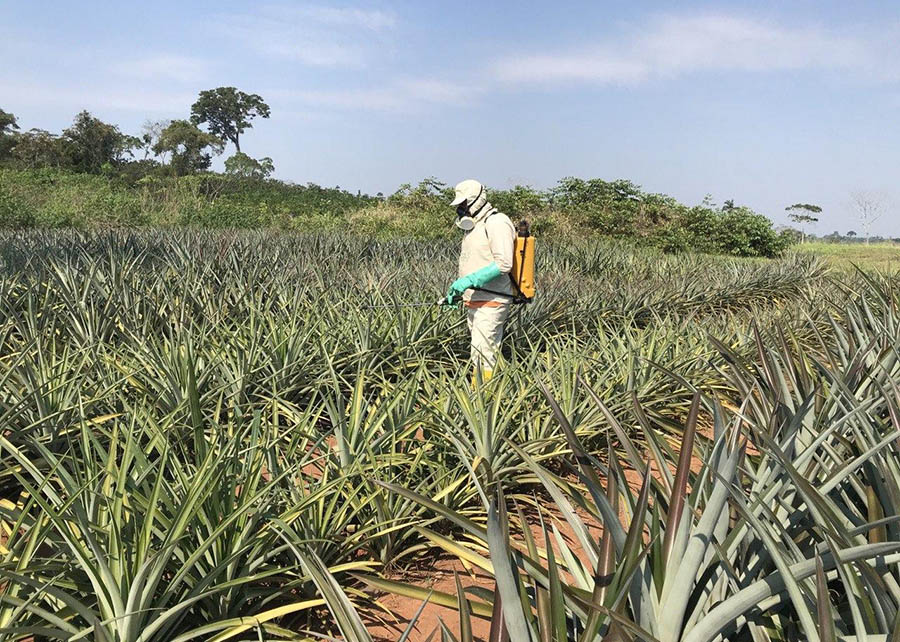 Use in organic agriculture Use in organic agriculture
The list of products for use in organic agriculture approved by the Brazilian Ministry of Agriculture, Livestock, and Food Supply (Mapa), covers essential oils from different sources. Due to its low impact, the spiked pepper essential oil developed by Embrapa can be used as a natural insecticide both in traditional agriculture and in organic production, an activity which is in continuous expansion in some regions of the country. For the farmer Jesuína Braga, president of the Associação de Certificação Participativa (ACS), the only association accredited to certify organic production in Acre, the main challenge of organic agriculture is the control of pests and diseases. Organic food consumption is a trend because it is related to health and environmental conservation, but it is necessary to have technologies that enable the farmer to produce with the guarantee that they will reap what they sow. "Currently, we count on only 52 families in the organic production in Acre, still an initial number. The botanical insecticide emerges as a hope for the development of the activity within the state. Natural defensives are products with aggregated value and can contribute to ensure the offer of healthy and safe food for the consumer with the advantage that it does not harm the environment. The research has a prime role in this process of knowledge advance in the improvement of organic production," the farmer considers. According to the agricultural tax auditor Gustavo Ferreira da Silva, chief of the Agricultural Defense Division at the Federal Superintendence of Agriculture, Livestock and Supply of Acre, in Brazil the demand for food coming from low impact production systems has shown an increase between 10% and 15% per year. In 2019 the number of properties with this characteristic certificated by Mapa surpassed 22,000. "We work in the support of such production arrangements, the appreciation of local knowledge, and the strengthening of the trade spaces of organic and agroecological family production, in addition to fostering government initiatives focused in generating income. On the other hand, the research aims to guarantee technological innovations that align production and sustainability, especially in organic systems," the auditor recalls. He also adds that the offer of a natural product developed from a plant of the Amazonian biodiversity with wide presence in the territory of Acre proves this scientific concern. |
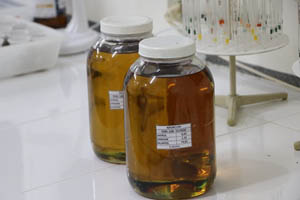 Essential oils and the bioeconomy
Essential oils and the bioeconomy
Embrapa studies revealed that there is a promising market for essential oils due to its wide industrial application (from the livestock segment, food industry, cosmetics and perfumery, to medicine production, among other uses). Most products are extracted from biodiversity and fit into the context of the bioeconomy, an strategic area that has emerged for the socioeconomic development of the Amazon biome.
"Spiked pepper can be part of a scenery of sustainable use of the region's biodiversity resources such as bioinput for the preparation of new technological solutions to improve production systems. In the context of innovation recommended by the National Bioinput Program, recently launched by Mapa, the species can contribute to generate jobs and income in local communities, reduction of the dependency of farmers to imported inputs, and expansion of the offer of raw materials for the agricultural sector," Fazolin assesses.
 Partnerships to have the technology reach the market
Partnerships to have the technology reach the market
The insecticides with natural active ingredients are products that are widely demanded once they can be used in the integrated management of pests in commercial crops in conventional agriculture and in organic production. Spiked pepper essential oil is an alternative for the development of new low cost agricultural defensives.
The essential oil with a dillapiole concentration of 80% is now in the process of establishing a reference specification in order to get a concession registration of regularity of use by Mapa, the Brazilian Health Regulatory Agency (Anvisa), and the Brazilian Institute of the Environment and Renewable Natural Resources (Ibama). The confirmation of the registration request enables the technology to go to the stage of business partnership formalization, focusing in the product use for the development of bioactive insecticides (those with biological activity in the behavior of pests) and as synergistic of biodegradable insecticides based on dillapiole.
Fazolin emphasizes that the partnership with agro-chemical companiesand other industrial segments is essential for the final stage of standardization and validation of technological innovation through commercial formulas that suit different crops, including thin leaf plants. Depending on the formula developed with the spiked pepper essential oil, the registration of a new technology should be created by the responsible company with the regulatory agencies of agricultural products.
"We are prepared for an initial production of the essential oil to supply partners that are interested in investing in the industrial use of dillapiole and we have quality generic materials that can be passed on to farmers to prepare the first commercial cultivars of Piper aduncum L. Moreover, we can share unprecedented technical knowledge on the purification process of spiked pepper essential oil at the same time that, from the increase of product demand, we will work together with the partners to clarify the topics that are still challenging in the production system of the species, in the final stage," Fazolin recalls.
To know more about this asset for partnership click here.
Diva Gonçalves (MTb: 0148/AC)
Embrapa Acre
Press inquiries
acre.imprensa@embrapa.br
Phone number: +55 68 99933-4412
Luís Filipe Escobar, supervised by Mariana Medeiros (translation - English)
General Secretariat
Further information on the topic
Citizen Attention Service (SAC)
www.embrapa.br/contact-us/sac/
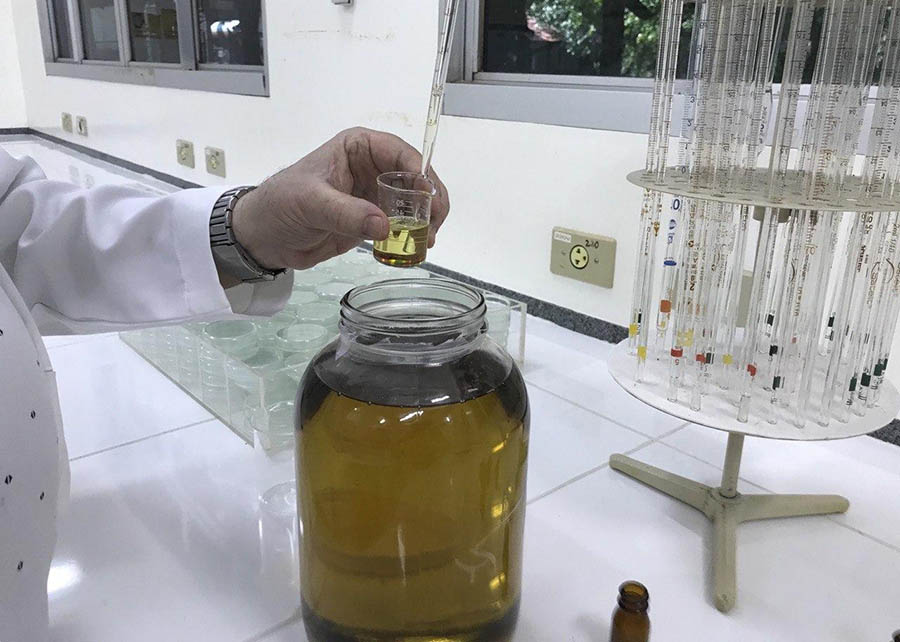
 Harmless to the environment
Harmless to the environment Results
Results  Essential oils and the bioeconomy
Essential oils and the bioeconomy Partnerships to have the technology reach the market
Partnerships to have the technology reach the market
